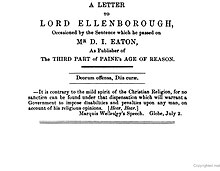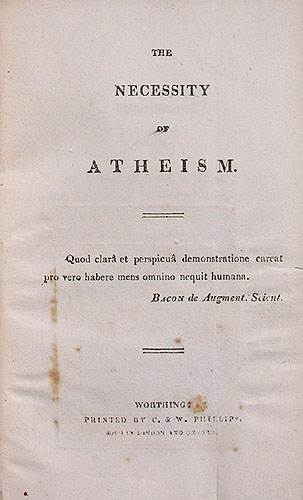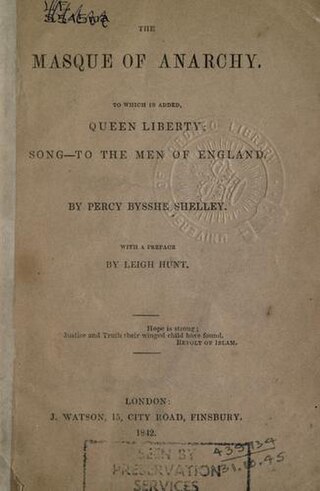
"A Letter to Lord Ellenborough" is a pamphlet written in 1812 by Percy Bysshe Shelley in defence of Daniel Isaac Eaton. [1] Printed in Barnstaple, the essay is approximately 4,000 words in length.

"A Letter to Lord Ellenborough" is a pamphlet written in 1812 by Percy Bysshe Shelley in defence of Daniel Isaac Eaton. [1] Printed in Barnstaple, the essay is approximately 4,000 words in length.
In the essay, Shelley argues for concepts which were then quite radical, including complete freedom of the press, and a tolerance for all published opinion, even when false. [2] The latter, he argued, would "ultimately be controverted by its own falsehood." [2]
The epigraph on the title page is by Tiberius from The Annals, Deorum Offensa, Diis curae. An offense to the gods is rectified by the gods.
A speech by the Marquess Wellesley from July 2 in the Globe is quoted.
In the Advertisement, Shelley wrote that he had waited for four months for someone to attack the sentence but when none was forthcoming, he wrote the letter. [3]
The title arises from the name of the letter's recipient, who directed the jury that convicted Eaton. Eaton had been tried and found guilty of "blasphemous libel", for being an atheist. [2] At the trial before Edward Law, 1st Baron Ellenborough, the Lord Chief Justice of England, what Mark Sandy of the University of Durham has called a "prejudiced jury" convicted Eaton for printing part three of Thomas Paine's Age of Reason . [1]
Daniel Eaton was put on trial in May 1812. During the trial, in which he was accused of being an atheist, as well as the aforementioned "blasphemous libel." In defending himself, Eaton claimed that his beliefs were not atheistic, but deistic. He attempted to argue that scripture was open to the type of critique that Paine had leveled in Age of Reason. He based this view on his belief that the god of the Old Testament was "a revengeful and primitive deity", while the Christ of the New Testament was "an exceedingly virtuous, good man, but nothing supernatural or divine." [2]
Despite the paucity of evidence, on 15 May 1812, the Ellenborough-led jury found Eaton guilty. His sentence was severe, including eighteen months in Newgate Prison and a monthly pillorying for the entire term of his sentence.
The letter was republished as Shelley on Blasphemy: Being His Letter to Lord Ellenborough, Occasioned by the Sentence which He Passed on Mr. D. I. Eaton in 1883 in London by the Progressive Publishing Company. [4]
The letter was republished in A letter to Lord Ellenborough: Occasioned by the Sentence Which He Passed on Mr. D.I. Eaton as publisher of the third part of Paine's 'Age of Reason' in 1894 in London by R. Forder. [5]

"The Necessity of Atheism" is an essay on atheism by the English poet Percy Bysshe Shelley, printed in 1811 by Charles and William Phillips in Worthing while Shelley was a student at University College, Oxford.

Edward Moxon was a British poet and publisher, significant in Victorian literature.

Edward Law, 1st Baron Ellenborough,, was an English judge. After serving as a member of parliament and Attorney General, he became Lord Chief Justice.
Laws prohibiting blasphemy and blasphemous libel in the United Kingdom date back to the medieval times as common law and in some special cases as enacted legislation. The common law offences of blasphemy and blasphemous libel were formally abolished in England and Wales in 2008 and Scotland in 2021. Equivalent laws remain in Northern Ireland.

Richard Carlile was an important agitator for the establishment of universal suffrage and freedom of the press in the United Kingdom.

The Masque of Anarchy is a British political poem written in 1819 by Percy Bysshe Shelley following the Peterloo Massacre of that year. In his call for freedom, it is perhaps the first modern statement of the principle of nonviolent resistance.

Queen Mab; A Philosophical Poem; With Notes, published in 1813 in nine cantos with seventeen notes, is the first large poetic work written by Percy Bysshe Shelley (1792–1822), the English Romantic poet.
The Society for the Suppression of Vice, formerly the Proclamation Society Against Vice and Immorality, or simply Proclamation Society, was a 19th-century English society dedicated to promoting public morality. It was established in 1802, based on a proclamation by George III in 1787, and as a successor to the 18th-century Society for the Reformation of Manners, and continued to function until 1885.
Events from the year 1792 in Great Britain.

The 1794 Treason Trials, arranged by the administration of William Pitt, were intended to cripple the British radical movement of the 1790s. Over thirty radicals were arrested; three were tried for high treason: Thomas Hardy, John Horne Tooke and John Thelwall. In a repudiation of the government's policies, they were acquitted by three separate juries in November 1794 to public rejoicing. The treason trials were an extension of the sedition trials of 1792 and 1793 against parliamentary reformers in both England and Scotland.

Percy Bysshe Shelley was a British writer who is considered one of the major English Romantic poets. A radical in his poetry as well as in his political and social views, Shelley did not achieve fame during his lifetime, but recognition of his achievements in poetry grew steadily following his death, and he became an important influence on subsequent generations of poets, including Robert Browning, Algernon Charles Swinburne, Thomas Hardy, and W. B. Yeats. American literary critic Harold Bloom describes him as "a superb craftsman, a lyric poet without rival, and surely one of the most advanced sceptical intellects ever to write a poem."
Peter Finnerty was an Irish printer, publisher, and journalist in both Dublin and London associated with radical, reform and democratic causes. In Dublin, he was a committed United Irishman, but was imprisoned in the course of the 1798 rebellion. In London he was a campaigning reporter for The Morning Chronicle, imprisoned again in 1811 for libel in his condemnation of Lord Castlereagh.
George Cannon (1789–1854) was an English solicitor, radical activist and publisher and pornographer who also used the pseudonyms Erasmus Perkins and Philosemus.

Mary Wollstonecraft Shelley was an English novelist who wrote the Gothic novel Frankenstein; or, The Modern Prometheus (1818), which is considered an early example of science fiction. She also edited and promoted the works of her husband, the Romantic poet and philosopher Percy Bysshe Shelley. Her father was the political philosopher William Godwin and her mother was the philosopher and women's rights advocate Mary Wollstonecraft.

Daniel Isaac Eaton (1753–1814) was an English radical author, publisher and activist. He was tried eight times for selling radical literature and convicted in 1812 for selling The Age of Reason.

"The Devil's Walk: A Ballad" was a major poetical work published as a broadside by Percy Bysshe Shelley in 1812. The poem consisted of seven irregular ballad stanzas of 49 lines. The poem was a satirical attack and criticism of the British government. Satan is depicted meeting with key members of the British government. The poem was modelled on and meant as a continuation of "The Devil's Thoughts" of 1799 by Samuel Taylor Coleridge and Robert Southey. The work is important in Shelley's development and evolution of writings that castigate and criticise the British government to achieve political and economic reform.

A Philosophical View of Reform is a major prose work by Percy Bysshe Shelley written in 1819-20 and first published in 1920 by Oxford University Press. The political essay is Shelley's longest prose work.

A Vindication of Natural Diet is an 1813 book by Percy Bysshe Shelley on vegetarianism and animal rights. It was first written as part of the notes to Queen Mab, which was privately printed in 1813. Later in the same year the essay was separately published as a pamphlet.

Rosalind and Helen, A Modern Eclogue; With Other Poems is a poem collection by Percy Bysshe Shelley published in 1819. The collection also contains the poems "Lines written on the Euganean Hills", "Hymn to Intellectual Beauty", and "Sonnet. Ozymandias". The collection was published by C. and J. Ollier in London.

"Poetical Essay on the Existing State of Things" is an essay by Percy Bysshe Shelley published in 1811. The work was lost since its first appearance until a copy was found in 2006 and made available by the Bodleian Library in 2015. The anti-war and anti-imperialist work was intended to raise money for the radical Irish journalist Peter Finnerty, who had been imprisoned for libeling the Anglo-Irish politician Robert Stewart, Viscount Castlereagh, whom he accused of mistreating United Irish prisoners. The work is a precursor to The Masque of Anarchy and "England in 1819".